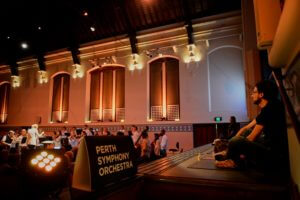Perth Symphony Orchestra
Perth Town Hall
reviewed by Neville Cohn
 What would most office workers do when it’s time to leave for the day? I imagine some might head for a drink at the nearest watering hole or perhaps do some hurried shopping for dinner before walking to a train station, bus stop or parking garage to head home. But the people who run Perth Symphony Orchestra came up with another possibility: offering city workers the chance to listen to a symphony concert before going home – and getting a little handy advice on yoga relaxation techniques for good measure.
What would most office workers do when it’s time to leave for the day? I imagine some might head for a drink at the nearest watering hole or perhaps do some hurried shopping for dinner before walking to a train station, bus stop or parking garage to head home. But the people who run Perth Symphony Orchestra came up with another possibility: offering city workers the chance to listen to a symphony concert before going home – and getting a little handy advice on yoga relaxation techniques for good measure.
On my way to the concert at Perth Town Hall, I wondered how many office workers would take the opportunity to attend a symphony performance straight after work rather than getting home as quickly as possible to put their feet up before the telly (if someone else was looking after dinner) or going into the kitchen to fix the evening meal.
In the event, the venue was packed out – and how inviting it was. Subdued lighting, small clusters of candles in tumblers set on window sills – and a range of pre- and post-concert drinks on offer in an adjoining room. And there were yoga mats on the stage floor for those who preferred that to conventional seating. And as concertgoers arrived by elevator or staircase to access the first floor hall, they were greeted by the sound of musicians offering pre-concert music in the tiny foyer. I was particularly impressed by Julia Watson’s finely considered offering of extracts from a Bach partita for unaccompanied violin. It was a frankly beautiful idea, a beautiful moment.
There was an almost palpable air of anticipation before the start of Mozart’s Jupiter Symphony, his 41st and last essay in the genre. With Jessica Gethin in top form directing proceedings from the podium, and the orchestra led with characteristic authority by Paul Wright, the work unfolded in exemplary fashion. There was a fine balance of power and grace in the opening allegro vivace. Cellos were in excellent fettle here. The andante cantabile was beautifully considered with as much focus on detail as on conveying the overall sweep of the movement. And the playing in the minuet was an essay in graceful strength with a frankly delightful buoyancy of both mood and momentum. The finale brought joyous energy in abundance as it flashed and glittered with fine detail.
 As was customary in Mozart’s day, the orchestra played standing (other than the cellists, of course). Audience seating was arranged around the orchestra, the players casually garbed in blue jeans and white tops. And from first note to last, there was about the playing a disciplined commitment which augurs well. Laurels, in particular, to the cellists and flautist; their contribution was particularly pleasing. The same could be said of the horn and trumpet players who were much on their mettle.
As was customary in Mozart’s day, the orchestra played standing (other than the cellists, of course). Audience seating was arranged around the orchestra, the players casually garbed in blue jeans and white tops. And from first note to last, there was about the playing a disciplined commitment which augurs well. Laurels, in particular, to the cellists and flautist; their contribution was particularly pleasing. The same could be said of the horn and trumpet players who were much on their mettle.
This was an important event. I hope there will be more of them. There’s clearly a demand for it.

 He was a horrible person. He treated women appallingly. His vanity was exceeded only by his vanity. He was ferociously anti-semitic – but never hesitated to appoint top-flight Jews to interpret his music when he needed them. So he was a hypocrite as well. Wagner also engaged in the German revolution of 1848-1849). He took part in the Dresden uprising and had to flee the country when a warrant for his arrest was issued. But he was, as well, a genius, a composer of unique and profound operas. And this was breathtakingly in evidence at the Concert Hall on Sunday when Asher Fisch presided over an account of Tristan and Isolde, presented in concert version.
He was a horrible person. He treated women appallingly. His vanity was exceeded only by his vanity. He was ferociously anti-semitic – but never hesitated to appoint top-flight Jews to interpret his music when he needed them. So he was a hypocrite as well. Wagner also engaged in the German revolution of 1848-1849). He took part in the Dresden uprising and had to flee the country when a warrant for his arrest was issued. But he was, as well, a genius, a composer of unique and profound operas. And this was breathtakingly in evidence at the Concert Hall on Sunday when Asher Fisch presided over an account of Tristan and Isolde, presented in concert version.